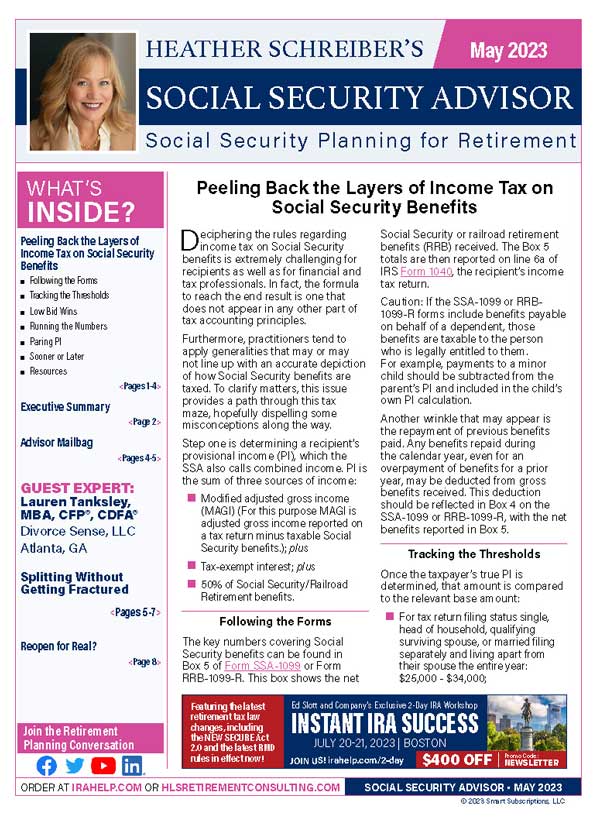Social Security benefits play a crucial role in providing financial support to millions of retirees and disabled individuals in the United States. As a government program, Social Security offers a safety net to ensure a certain level of income during retirement; the average retiree should anticipate the monthly benefits to replace roughly 40% of his/her pre-retirement income. However, it is important to understand the implications of claiming these benefits early, as it can significantly impact the amount you receive lifelong. And, if you plan to work to supplement your benefits, the earnings test may take you by surprise, if your earnings exceed certain limits.
The Consequences of Claiming Social Security Benefits Early
While you have the option to claim Social Security benefits as early as age 62, doing so should come with thoughtful consideration prior to making the claim. One of the most significant factors to consider is the (generally) permanent reduction in your monthly benefit amount. If you claim before reaching your full retirement age (FRA), which is typically between 66 and 67 depending on your birth year, your benefit amount will be permanently reduced by a certain percentage. This reduction can range from 25% to 30% depending on how early you claim.
In addition to the permanent reduction in benefits, if you continue to work, you also face the annual earnings test. This test determines how much you can earn from working while still receiving your Social Security benefits. If you exceed the earnings limit, a portion of your benefits will be withheld. For every $2 earned above the limit, $1 of benefits will be withheld if you are under your full retirement age for the entire year. It is crucial to understand this test and its implications to effectively navigate the Social Security system.
Understanding the Social Security Earnings Test and Its Impact on Benefits
The earnings test is designed to limit the wages or self-employment income an early filer can earn and still collect full Social Security benefits. The earnings limit for 2023 of is $21,960 per year for individuals who have not reached the year their full retirement age. If you exceed this limit, $1 of benefits will be withheld for every $2 earned above it. A more generous limit applies in the year that FRA is reached. It is important to note that only earned income, such as wages and self-employment income, is considered for the earnings test. Other sources of income, such as pensions, investments, rental income, or the earnings of your spouse, do not count towards this limit.
The earnings test only applies until you reach your full retirement age. Once you reach this milestone, you can earn any amount without any reduction in your Social Security benefits. Furthermore, any benefits withheld due to the earnings test are not lost forever. Once you reach your full retirement age, your benefit amount will be recalculated to give you credit for the months in which benefits were withheld.
Common Pitfalls to Avoid When Navigating the Earnings Test
Navigating the earnings test can be challenging, and there are common pitfalls that you should avoid if you plan to work to supplement your benefits. One of the most significant pitfalls is underestimating the impact of the test on your benefits. If your income exceeds the limit, SSA will withhold monthly benefits until the excess is accounted for. This may not go well if you are relying on the monthly benefits to make ends meet.
Another pitfall to avoid is if you return to work after an early claim, you should contact SSA right away if you believe that your earnings will exceed the annual exempt amount. Failure to do so could result in SSA asking for the excess benefits you received to be paid back.
If you do experience a withholding of benefits due to your earnings, those benefits are not lost forever. Once you reach your full retirement age, your monthly income benefit will increase to account for the months of benefits previously withheld.
Tips for Managing Your Earnings and Benefits Effectively
Managing your earnings and benefits effectively is key to optimizing your Social Security benefits. Here are some tips to help you navigate the earnings test and make informed decisions:
- Plan your retirement income: Consider the impact of the earnings test on your benefits when planning your retirement income. Consider factors such as your desired lifestyle, other sources of income, and the timing of when benefits will be withheld.
- Understand the earnings exempt amount: The earnings exempt amount is the threshold above which benefits are withheld. Stay informed about the current limit and ensure that your earnings stay below this threshold to avoid any reduction in benefits.
- Consider delaying your claim: If possible, consider delaying your Social Security claim until reaching your full retirement age or beyond. By doing so, you can avoid the earnings test altogether and receive your full benefit amount without any reduction.
Seek Professional Advice for Optimizing Your Benefits
Given the complexity of the Social Security rules, seeking professional advice can be invaluable in optimizing your benefits. Financial professionals and Social Security specialists can provide personalized guidance based on your unique circumstances. They can help you navigate the earnings test, understand various claiming strategies, and make informed decisions that align with your financial goals.
- Understanding Medicare’s Initial Enrollment Period - August 2, 2024
- Social Security Cost-of-Living Adjustment for 2024: The Numbers Are In! - November 13, 2023
- The Importance of the Medicare Open Enrollment Period - November 3, 2023





